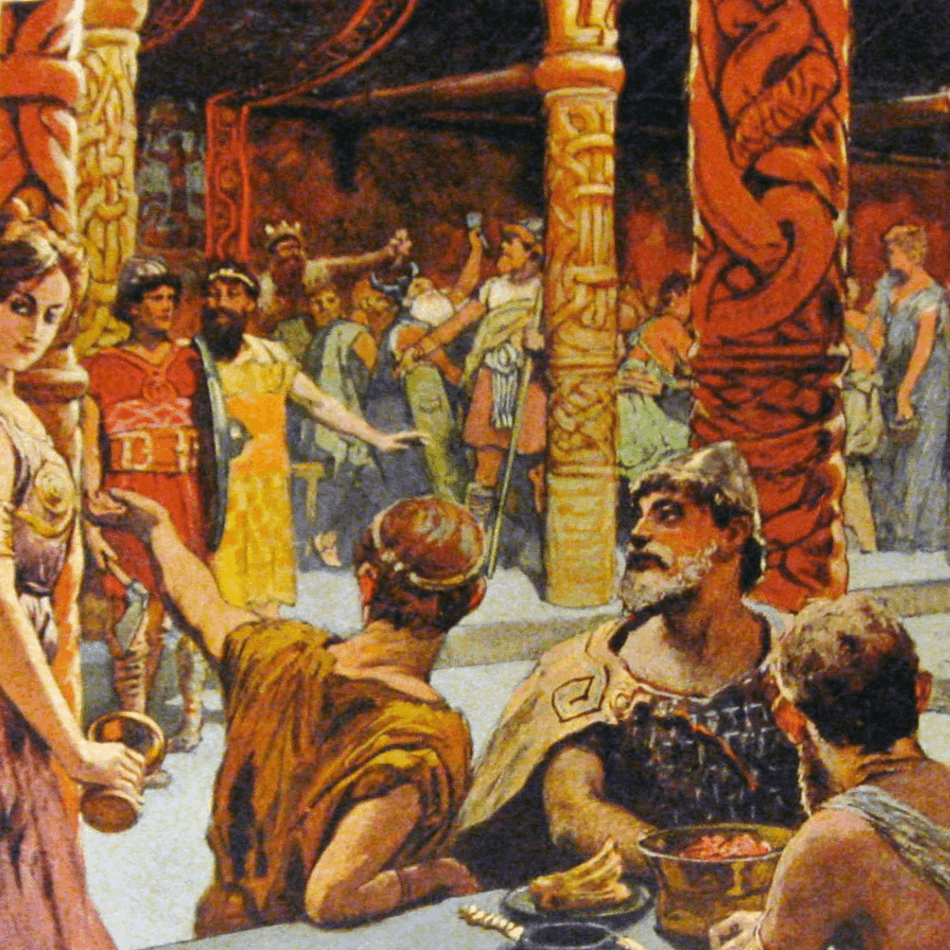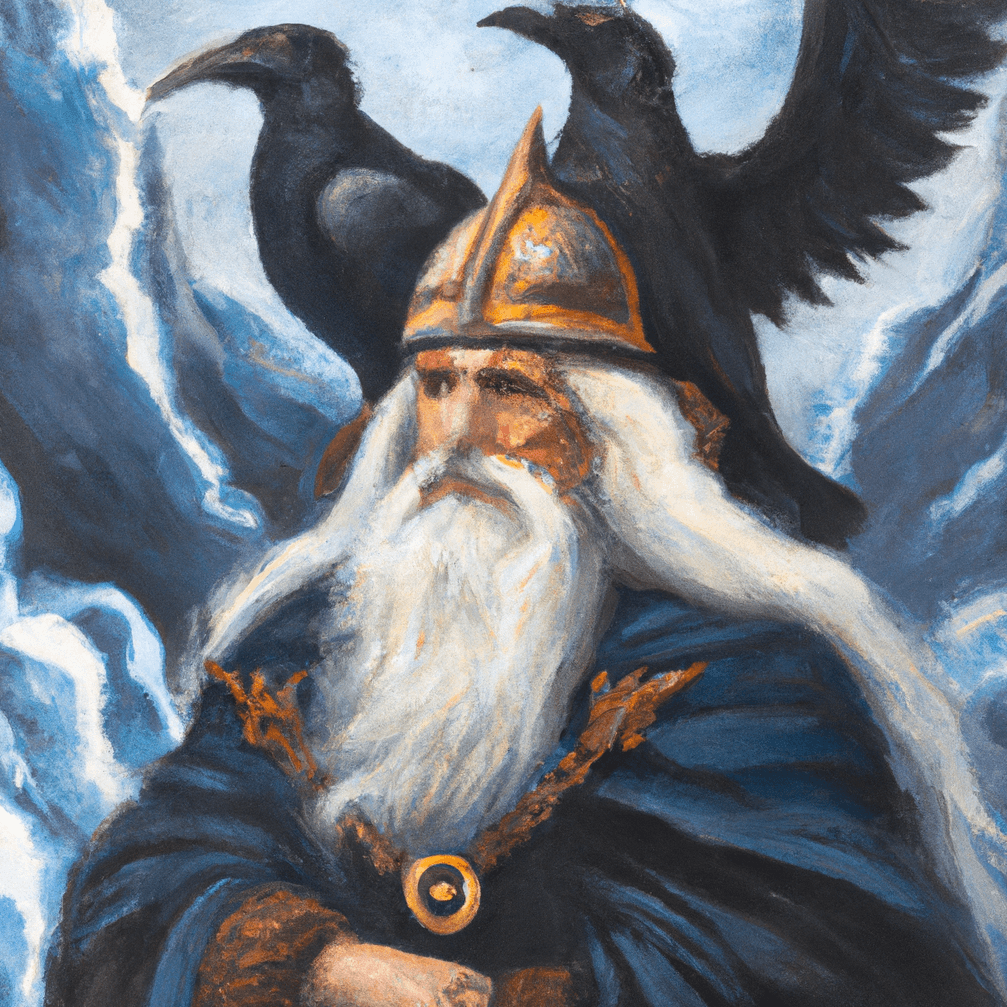Fafnir: The Dragon-Dwarf and Curse of Avarice
Norse mythology is a treasure trove of intriguing characters and epic tales, but few are as captivating and fearsome as Fafnir, the dragon. Fafnir's story is one of greed, betrayal, and transformation, and it has left an indelible mark on Norse folklore. In this article, we will delve into the fascinating tale of Fafnir, exploring his origins, his transformation into a dragon, and his ultimate fate.
The Origins of Fafnir
Fafnir's story begins with his family. He was the son of Hreidmar, a skilled dwarf and a masterful blacksmith. Hreidmar had two other sons, Regin and Otr. One fateful day, Odin, Loki, and Hoenir ventured to the waterfall of Andvari, a dwarf known for his extraordinary wealth and his unique ability to transform into a pike at will. While they took a break by the river's edge, the cunning trickster Loki spied Otr, who had assumed the form of an otter. Otr had just captured a salmon and was reveling in his meal on the riverbank, unaware of Loki's presence. Devoid of knowledge about the otter's true identity, Loki slew Otr and claimed his pelt as a coveted prize.

The three gods resumed their journey and eventually arrived at Hreidmar's lodge, where they intended to spend the night. However, upon laying eyes on the otter pelt Loki had brought with him, Hreidmar was consumed by anger and demanded that the gods pay a weregild – the monetary price for taking another's life.
To make amends for the loss of Hreidmar's son, Otr, Loki and Odin set out with a fishing net to search for Andvari's treasure hidden beneath the river's surface. This act did not sit well with Andvari, who watched in frustration as the gods ensnared his trove of red gold and other precious items, including Andvari's fabled gold-finding ring and the renowned Helm of Awe. Despite his powerlessness to prevent their actions, Andvari couldn't help but curse the treasure, ensuring that it would bring misfortune to anyone who possessed it.
Having received the weregild, Hreidmar allowed the gods to continue their journey. However, the cursed gold proved irresistibly enticing to Fafnir and Regin, who approached their father, hoping to share in the treasure. Regrettably for them, Hreidmar adamantly denied his sons' request.
Driven by a sudden surge of avarice, Fafnir committed a heinous act, slaying his own father and claiming the entirety of the gold for himself. Determined to prevent his brother from laying hands on the cursed hoard, Fafnir secreted it deep within a concealed cave nestled far within the forest. There, he took on the role of its vigilant guardian, resting atop the glittering riches as their protector.
As he accumulated more and more gold and jewels, assisted by the magic ring of Andvari, Fafnir underwent a profound transformation. His heart grew ever colder, and his physical form underwent a grotesque metamorphosis, turning him into a formidable dragon. Adorning the fabled Helm of Awe, he struck terror into the hearts of all who dared to oppose him. This transformation was not merely physical; it represented the corruption of his soul, as he became a creature driven solely by greed and the desire to protect his ill-gotten riches.
The Hero's Quest
Regin, Fafnir's brother and a skilled smith himself, was not content to let his brother's monstrous form go unchecked. He sought the aid of the legendary hero Sigurd (also known as Siegfried in Germanic mythology). Armed with a mighty sword, Gram, which had been reforged for him by Regin, Sigurd set out on a perilous quest to slay Fafnir and claim the treasure.

Sigurd soon located Fafnir's lair and discerned the distinct trail the dragon left as it slithered to the water's edge to quench its thirst. Ingeniously, Sigurd devised a plan: he excavated a concealed trench along Fafnir's path and patiently lay in wait within it, his sword gripped tightly.
As Fafnir lumbered towards the water, Sigurd seized the moment and, from the hidden trench beneath, inflicted a grievous, mortal wound by slicing open the dragon's belly. The impending doom brought a moment of realization to Fafnir, and in his final moments, he implored Sigurd to reveal his name, yearning to know the identity of the valiant adversary who had felled him. In return, Fafnir offered Sigurd a dire warning about the curse bound to the gold and its potent influence over his family.
With Fafnir's demise, Regin summoned the courage to approach the dragon's lifeless body and cut out his brother's heart. Sigurd and Regin then kindled a fire, and as Regin succumbed to exhaustion from the hunt, he beseeched Sigurd to roast the heart over the flames. Sigurd obliged, yet in the process, he inadvertently scorched his finger and sucked on it, the same finger that had been tainted by Fafnir's blood.
Remarkably, this contact with Fafnir's blood bestowed upon Sigurd a unique gift - a newfound understanding of the language of animals. In the vicinity, perched upon branches and rocks, seven birds engaged in spirited chatter. They gleefully discussed the ominous curse associated with the gold and Regin's treacherous plot to eliminate Sigurd and seize the entirety of Fafnir's treasure hoard.
Armed with this newfound knowledge, Sigurd made a resolute decision. As Regin slumbered, unaware of the impending betrayal, Sigurd unsheathed his sword and decapitated Regin in his sleep. With both brothers now lifeless, Sigurd partook of their blood and consumed Fafnir's heart, acquiring an abundance of worldly wisdom. Sigurd then loaded Fafnir's substantial treasure onto his trusty steed and continued his journey, his fate forever altered by the cunning and courage that had led him to this point.
Fafnir's story in Norse mythology serves as a cautionary tale about the perils of greed and the consequences of one's actions. From his origins as a dwarf to his transformation into a dragon, Fafnir's tale is a testament to the enduring power of myth and legend. It reminds us that even those closest to us can be corrupted by greed and power, but even despite their newly gained might these most formidable adversaries can still be defeated by those who possess courage, integrity, and a sense of justice. Fafnir's legacy lives on as a symbol of the destructive nature of avarice, a lesson that continues to resonate with audiences today.









